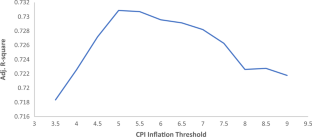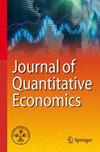通货膨胀与增长的关系:印度的新证据
IF 0.6
Q3 ECONOMICS
引用次数: 0
摘要
本文重新审视了印度的通货膨胀临界水平。实证分析采用的是 1996-97Q1 至 2019-20Q4 期间的样条回归。结果表明,无论从消费物价指数还是从生产者物价指数来看,5%-5.5%的通胀率在统计上都是一个重要的临界水平。在此水平以下,通货膨胀对经济增长的影响一般为正,而在此水平以上则为负,因此对经济增长有害。因此,印度的政策制定者可以考虑在灵活的通胀目标制度下将可容忍范围从 4±2% 降低到 4±1.5%,并在适当的时候将其进一步压缩到 4±1%。本文章由计算机程序翻译,如有差异,请以英文原文为准。

Inflation-Growth Relationship: New Evidence for India
This paper revisits the threshold level of inflation for India. The empirical analysis follows spline regression for the period 1996–97Q1 to 2019–20Q4. The results suggest the existence of a statistically significant threshold level of inflation at 5 to 5.5% in terms of both CPI and WPI. Below this level, the impact of inflation on growth is generally positive whereas it is negative above this level, and therefore injurious to growth. Hence, policymakers in India may consider reducing the tolerable band from 4 ± 2% to 4 ± 1.5% under the flexible inflation targeting regime with a vision to further compress it to 4 ± 1% in due course.
求助全文
通过发布文献求助,成功后即可免费获取论文全文。
去求助
来源期刊

JOURNAL OF QUANTITATIVE ECONOMICS
ECONOMICS-
CiteScore
1.10
自引率
0.00%
发文量
0
期刊介绍:
The Journal of Quantitative Economics (JQEC) is a refereed journal of the Indian Econometric Society (TIES). It solicits quantitative papers with basic or applied research orientation in all sub-fields of Economics that employ rigorous theoretical, empirical and experimental methods. The Journal also encourages Short Papers and Review Articles. Innovative and fundamental papers that focus on various facets of Economics of the Emerging Market and Developing Economies are particularly welcome. With the help of an international Editorial board and carefully selected referees, it aims to minimize the time taken to complete the review process while preserving the quality of the articles published.
 求助内容:
求助内容: 应助结果提醒方式:
应助结果提醒方式:


